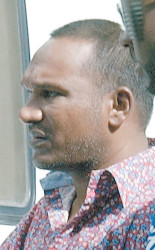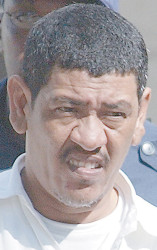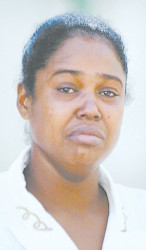Four Guyanese who were jailed in Barbados in December, 2009 over cocaine in lumber will have their applications for leave to appeal against their convictions heard by the Barbados Court of Appeal following a ruling by the top court in the region, the CCJ on February 3rd, 2016.
Considering the applications of Rohan Shastri Rambarran, Lemme Campbell, Somwattie Persaud and Wayne Gavin Green, the Caribbean Court of Justice (CCJ) disagreed with the Barbados Court of Appeal’s finding on February 5th, 2015 that the notice of appeal by three of them had been filed out of time.
The CCJ further ruled that the Barbados Court of Appeal had also erred in its oral decision of March 13th, 2015 when it found itself functus officio (of no further official authority) and in finding the four applications before it for an extension of time to appeal as an abuse of the process.

While the bid to appeal their convictions may be of little effect to Persaud and Green since their sentences are set to expire in March this year on account of the time they had spent in prison prior to sentencing, the ruling by CCJ has castigated the Barbadian judiciary for the lengthy delays in considering the applications. The question of whether the notice to appeal had been filed out of time also divided the CCJ resulting in both a majority and a dissenting opinion being offered.
On 4th June 2009 a jury found the four Guyanese and others guilty of several drug-related offences under the Drug Abuse (Prevention and Control) Act. On 11th December 2009, the trial judge sentenced the quartet to various terms of imprisonment to run concurrently, ranging from a minimum of 15 years to a maximum of 30 years. The following appeals were subsequently filed:
-Rambarran gave notice applying for leave to appeal against conviction on 9th July 2009 and against sentence on 30th December 2009;
-Green gave notice applying for leave to appeal against conviction and sentence on 16th December 2009;
-Campbell gave notice applying for leave to appeal against conviction and sentence on 21st December 2009; and

-Persaud gave her notice applying for leave to appeal against conviction and sentence on 5th January 2010, though she had signed the notice in prison on 31st December 2009.
The ruling by the CCJ said that these notices were accepted by the court office, and after nearly five years, the matter came up for hearing on 23rd September 2014, at which date the Director of Public Prosecutions (DPP), for the first time, took a point at the start that the appellants had not complied with the 21-day statutory requirement as provided in section 19 of the Criminal Appeal Act. On 5th February 2015, the Barbados Court of Appeal ruled that the appellants’ notices of appeal were filed out of time i.e. outside the time limit of 21 days after conviction as prescribed by the statute; and therefore there were no valid appeals against conviction before the court. On the eve of that decision, the CCJ ruling said that on 4th February 2015, Rambarran had filed an application in the same proceedings for an extension of time to appeal his conviction in accordance

with section 19(2) of the Act. Subsequently, Persaud and Green filed similar applications on 9th February and 10th February 2015, respectively. On 13th March 2015, the Court of Appeal, without hearing any oral arguments, dismissed the applications on the ground that the court was functus officio and had no jurisdiction to hear the applications, and that the applications constituted an abuse of the court’s process.
Two issues
The CCJ said it had two issues to determine:

-Whether the time for filing a notice of appeal or an application for leave to appeal pursuant to section 19(1) of the Act against a conviction expires when such notice or application has not been given within twenty-one days of the determination of guilt by the jury or within the twenty-one days of the date of sentence; and
-Whether, on the facts of this case, the Court of Appeal properly refused to expand the time for filing such a notice applying for leave to appeal against conviction pursuant to section 19(2) of the Act pertaining to an applicant who had filed such a notice but which had been dismissed by the court as being out of time.
The ruling said that the CCJ addressed the practice which, the appellants insisted, existed in Barbados. A sworn affidavit, which included several exhibits and notices of appeal, revealed some 37 cases where the notices of appeal against conviction were lodged after sentence was passed, and each filing went unchallenged by the prosecution, the CCJ said.
“A majority of the Court concluded that there is a longstanding accepted practice in Barbados whereby notice of application for leave to appeal against conviction is lodged after sentence has been imposed, even when there is a delay between the two events”, the CCJ decision said. This finding meant that three of the four applications for leave to appeal their convictions would have been filed in time. This finding was disputed by two of the justices. The majority comprised the President of the Court, Sir Dennis Byron, Justice J Wit and Justice D Hayton. The judges who disagreed were Justice M Rajnauth-Lee and Justice R Nelson
As it relates to the second issue, the Court said it was of the view that the decision of the Court of Appeal to decline hearing the applications for extension of time on functus officio and abuse of process grounds was wrong. While acknowledging the importance of finality in relation to judicial matters, the CCJ said that adjudicating on an application for an extension of time and adjudicating on whether the filing is out of time are two separate exercises which involve different considerations. Accordingly, the CCJ said that the Barbados Court of Appeal in refusing to hear the applications wrongly deprived itself of the opportunity to take into account the merits of the appeals.
The CCJ noted that the two appellants (Persaud and Green) who were sentenced to 15 years would complete their terms in March 2016, with the potential result of their sentences ending without a hearing of their appeals.
“This is another example of the inordinate systemic delay of the Barbados judiciary. The Court considered that the Court of Appeal should hear the applications for leave to appeal against conviction (together with those against sentence) with expedition”, the CCJ declared.
Falling outside
In making its orders, the Court noted that Persaud had filed her notice to appeal against conviction and sentence on 5th January 2010, thereby falling outside of the 21-day window mandated by Section 19(1) of the Act. As a result, Persaud would still have had to file a notice for extension of time to appeal against conviction under these circumstances, which she did in fact file on 9th February 2015. The CCJ using its powers therefore granted Persaud the necessary extension of time.
Consequently, the Court allowed the appeals and made the following declarations:
First, “conviction”, in the context of section 19(1) of the Barbados Criminal Appeal Act, Cap. 113A, means the date on which an accused is sentenced after having been found guilty; and that notice must be given of an appeal or an application for leave to appeal before twenty-one days have elapsed since the date of conviction.
Second, the Court of Appeal in its oral decision of 13th March erred in finding itself functus officio and in finding the applications before it for an extension of time to be an abuse of process.
In all four cases the appellants’ applications for leave to appeal their conviction were remitted to the Barbados Court of Appeal for an expedited hearing and determination of their application in accordance with the order of the Court of Appeal that originally scheduled the hearing on the 21st to 24th July 2014. No orders were made as to costs.
Campbell, his wife Persaud; Christopher Bacchus, 43, and his wife Dianne Bacchus, 37; Green and Rambarran were convicted of six counts relating to a police seizure of hundreds of kilos of both cannabis and cocaine at a house in Bay Gardens, St Michael on June 4, 2009. They had been held in November, 2005.
Campbell, whom Justice Goodridge said played a “major role” in the incident was sentenced to 115 years in prison – 15 years for importing, 15 years for possession and 20 years for trafficking in cannabis; 20 years for importing, 20 years for possession, and 25 years for trafficking in cocaine.
Persaud, whom the judge said played a “subordinate role” in the incident and who was told that “immediate release was not an option” was sentenced to 47 years in prison – ten years for possession of cannabis, 12 years for trafficking of cannabis; ten years for possession and trafficking in cocaine 15 years.
Christopher Bacchus was sentenced to 47 years in prison – ten years for possession of cannabis; ten years for possession of cocaine; 12 and 15 years for trafficking in cannabis and cocaine respectively.
Diane Bacchus was sentenced to 47 years in prison – ten years for possession of cannabis; ten years for possession of cocaine; 12 and 15 years for trafficking of cannabis and cocaine respectively.
Green was sentenced to 47 years in prison – ten years for possession of cannabis; ten years for possession of cocaine; 12 and 15 years for trafficking of cannabis and cocaine respectively.
Rambarran was sentenced to 125 years in prison – 15 years for the importation, 15 years for possession and 25 years for trafficking cannabis; 20 years for importation, 20 years for possession and 30 years for trafficking of cocaine.
As the sentences were to run concurrently, Campbell was to serve 25 years, Persaud 15 years, Christopher and Diane Bacchus 15 years each, Green 15 years and Rambarran 30 years in prison.




